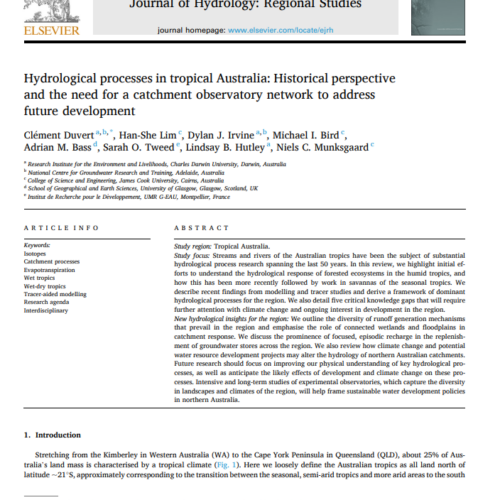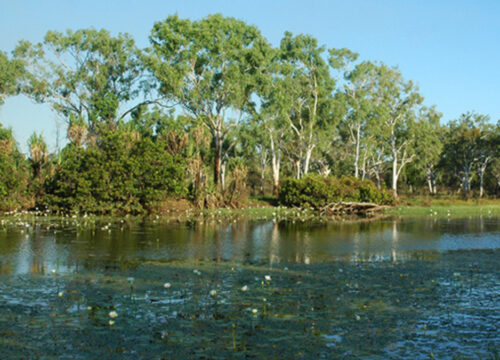
- Author Duvert, C., Lim, HS., Irvine, D.J., Bird, M., Bass, A.M., Tweed, S.O., Hutley, L.B., Munksgaard, N.C
- Type Report
- Documents
- Strategic policy development
- Water Security program
Summary
Streams and rivers of the Australian tropics have been the subject of substantial hydrological process research spanning the last 50 years. In this review, we highlight initial efforts to understand the hydrological response of forested ecosystems in the humid tropics, and how this has been more recently followed by work in savannas of the seasonal tropics. We describe recent findings from modelling and tracer studies and derive a framework of dominant hydrological processes for the region. We also detail five critical knowledge gaps that will require further attention with climate change and ongoing interest in development in the region. New hydrological insights for the region: We outline the diversity of runoff generation mechanisms that prevail in the region and emphasise the role of connected wetlands and floodplains in catchment response. We discuss the prominence of focused, episodic recharge in the replenishment of groundwater stores across the region. We also review how climate change and potential water resource development projects may alter the hydrology of northern Australian catchments. Future research should focus on improving our physical understanding of key hydrological processes, as well as anticipate the likely effects of development and climate change on these processes. Intensive and long-term studies of experimental observatories, which capture the diversity in landscapes and climates of the region, will help frame sustainable water development policies in northern Australia.
Published: Journal of Hydrology: Regional Studies
https://authors.elsevier.com/sd/article/S2214-5818(22)00207-5
Projects
Water Security for Northern Australia program: Co-design phase
This project will organise the collective expertise of 3 north Australian-based universities (James Cook University, Charles Darwin University and Central Queensland University) who have recently formed the Northern Australia Universities Alliance (NAUA). The NAUA partners will collaborate on undertaking a program of stakeholder engagement and research needs analysis in 4 focal catchments (Nodes) in order to design, develop and cost a cohesive and impactful 3.5 year research program that delivers on the core priorities of those stakeholders in those 4 focal catchments. These have been identified as: Wider Tindal Basin, NT Douglas Daly and Roper River, NT Lower Fitzroy Basin/ Gilbert River, catchment QLD Kimberley-Ord Irrigation Scheme, WA The research will involve the project team gaining a better understanding of the constraints to agricultural and water resource development, engaging with key stakeholders and government agencies to better understand the issues they believe are priorities for further research and then to develop a suitable research plan to address the issues identified during this process. The research approach is largely based on desktop analysis, literature review, stakeholder engagement and meetings. No new primary information is expected to be generated in the first 6 month phase represented by this proposal. However, the activities in this proposal will generate a coherent research program that answers research priorities identified during this development phase.


